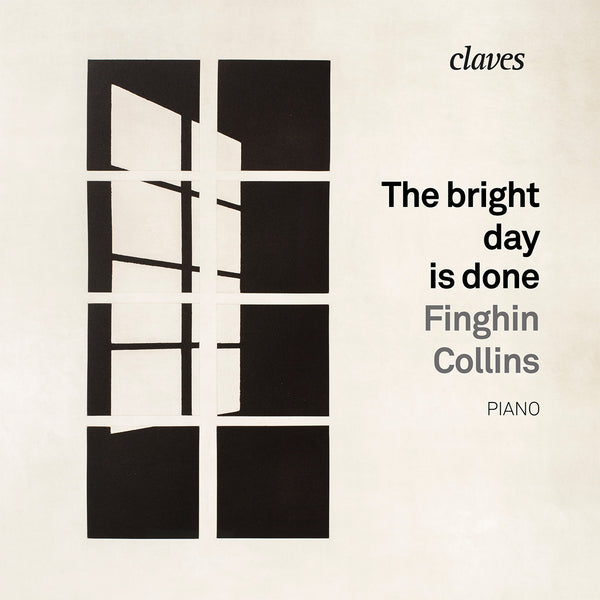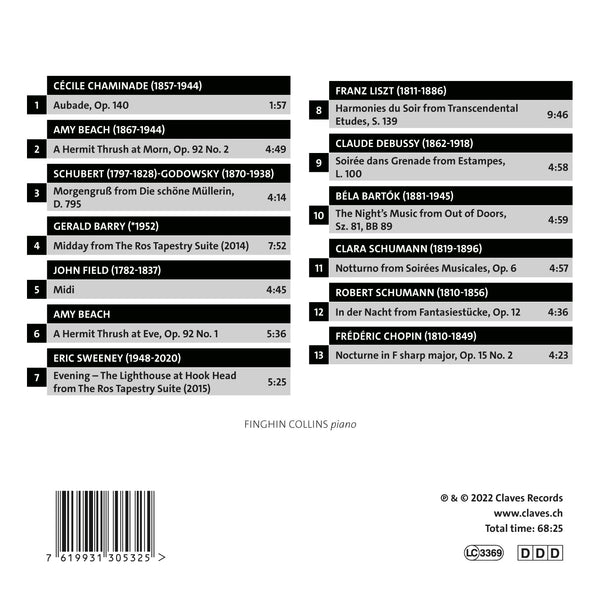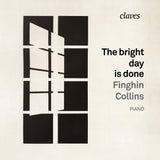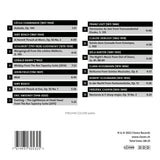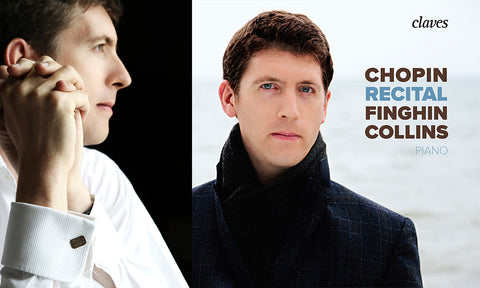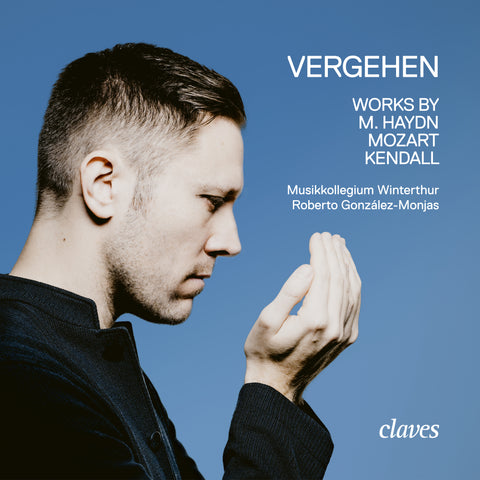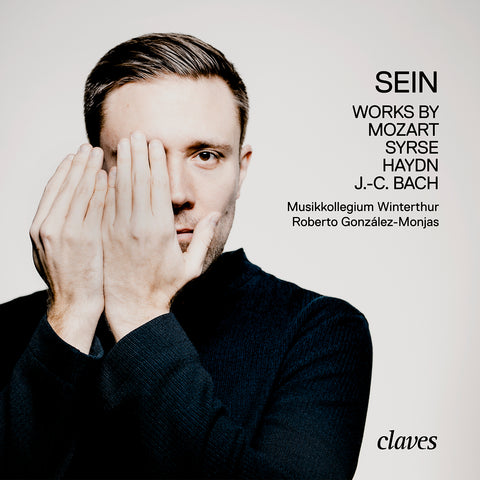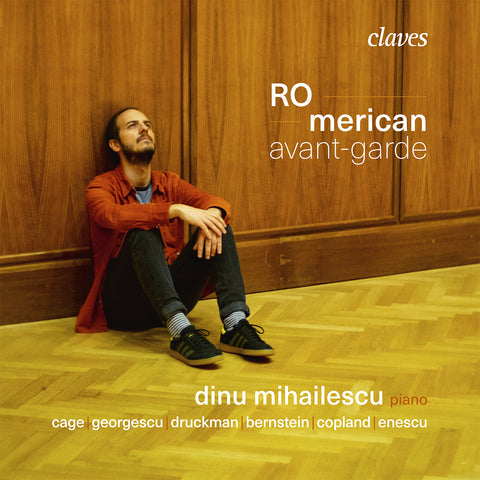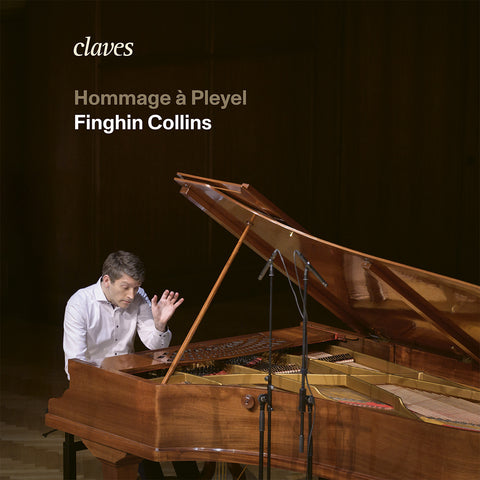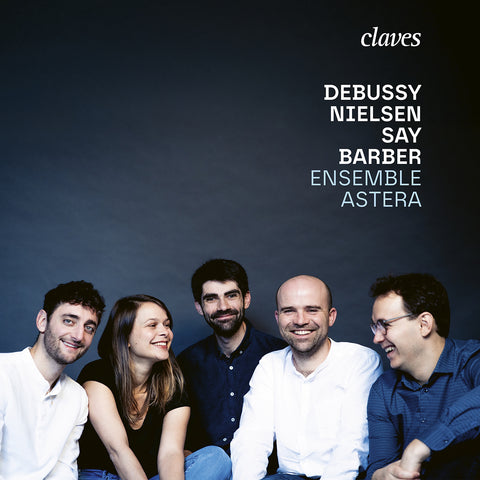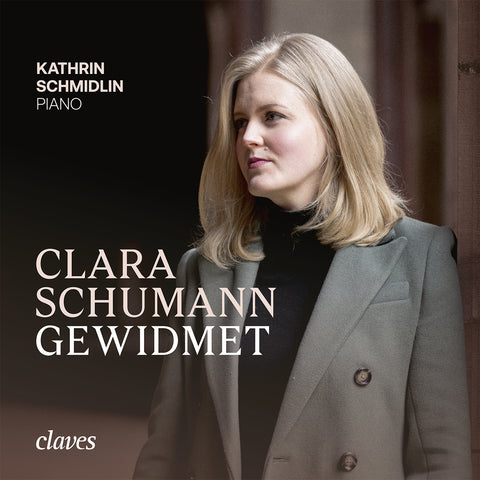(2022) The bright day is done
Category(ies): Piano Rarities
Instrument(s): Piano
Main Composer: Various composers (see collections)
CD set: 1
Catalog N°:
CD 3053
Release: 11.11.2022
EAN/UPC: 7619931305325
This album is now on repressing. Pre-order it at a special price now.
CHF 18.50
This album is no longer available on CD.
This album has not been released yet. Pre-order it from now.
CHF 18.50
This album is no longer available on CD.
CHF 18.50
VAT included for Switzerland & UE
Free shipping
This album is no longer available on CD.
VAT included for Switzerland & UE
Free shipping
This album is now on repressing. Pre-order it at a special price now.
CHF 18.50
This album is no longer available on CD.
This album has not been released yet.
Pre-order it at a special price now.
CHF 18.50
This album is no longer available on CD.
CHF 18.50
This album is no longer available on CD.
THE BRIGHT DAY IS DONE
>> Textes en Français dans le livret <<
“I’ve just listened to the entire recording of the Ros Tapestry Suite”, she said, “without looking at the booklet. And one of the pieces that stood out to me was “Midday” by Gerald Barry. I started thinking about creating a programme based around different times of the day.”
The speaker was Ciara Higgins, artistic director of the Dublin International Chamber Music Festival, it was late March 2021. Within a short space of time, we had put together a programme and in June 2021 I performed the recital online at Farmleigh House in Dublin’s Phoenix Park.
From this recital came the idea for the present CD recording, with the programme more or less unchanged; the Liszt work was added afterwards.
The concepts of morning and evening, of night and day, of sleep and wakening, are ones that are universal to all humankind. I have long been fascinated by the cyclical nature of the day and night, and in particular I am in awe of the healing and restorative properties of sleep,
“Sleep that knits up the ravell’d sleeve of care / The death of each day’s life, sore labour’s bath...”,
in the inimitable words of the Bard; and in fact the title of the disc also comes from Shakespeare, from his tragedy Antony and Cleopatra:
“Finish, good lady; the bright day is done, and we are for the dark.”
And so the idea of putting together a programme of solo piano works inspired by this theme appealed to me immediately. It allows for a programme of pieces which is diverse in its range of composers, periods and moods, and in which the pieces can be enjoyed individually or as a complete journey.
The choice of works is quite personal and is reflective of my own existing repertoire, as well as some works I chose to learn especially for the project. The programme does not seek to be in any way comprehensive – and indeed if one were to focus on night time alone, there would be enough nocturnal repertoire to stretch across many CDs. Repertoire focussed on earlier times of the day is more scant, but it was a joy to discover Cécile Chaminade’s simple and fresh Aubade or Dawn Song, guiding us gently into the light of the day.
We then hear the first of two pieces composed by Amy Beach at the MacDowell artists’ retreat in New Hampshire in 1921. Both pieces, A Hermit Thrush at Morn and A Hermit Thrush at Eve, showcase the eponymous North American bird whose song has been described as the finest sound in nature; certainly, Beach’s accurate and beautifully choreographed evocations do nothing to dispel this theory. Similarly gentle but tinged with sadness is Leopold Godowsky’s florid 1927 transcription for solo piano of Morning Greeting, the eighth song from Schubert’s song cycle Die schöne Müllerin / The Fair Maid of the Mill.
As we move towards the middle of day, pieces by two very different Irish composers are juxtaposed. Gerald Barry’s contribution to the Ros Tapestry Suite, to which he appended the title Midday, seeks to conjure the tense and expectant atmosphere on the south Wexford coast as the Irish people awaited the arrival of the Normans in 1169. The piece is made up of small musical gestures repeated again and again to hypnotic effect. This leads seamlessly into Midi by the doyen of Irish composers and inventor of the Nocturne, John Field, a lively and charming Rondo whose ending is crowned by the tolling of the twelve bells of midday.
We slip into the evening with Amy Beach’s second Hermit Thrush piece, which is followed by another piece from the Ros Tapestry Suite, Eric Sweeney’s evocation of the waves crashing into the ancient lighthouse at Hook Head on Ireland’s south-east coast and the nearby monks chanting Ubi Caritas. We then hear the most substantial piece on the programme, Franz Liszt’s Harmonies of the Evening, the eleventh of his Transcendental Etudes, whose atmospheric opening soon gives way to a predictably Lisztian dramatic climax before returning to its initial calm.
The listener is then transported to the sultry climes of Andalucia for Debussy’s Evening in Granada with its hypnotic habañera rhythms.
As night sets in we find ourselves in deepest Hungary. Béla Bartók conjures up a magical world of birds, frogs and insects in the Night's Music from his Out of Doors Suite, also managing to fit in a wedding song and a song of mourning. Clara Schumann’s Notturno, composed when she was just 17, is one of her most beautiful compositions, yearning and resigned. Her husband’s fantasy-piece In the Night, composed three years later, could not be more contrasting – turbulent, troubled and passionate, maybe suggesting a sleepless night. As an encore to calm us down and to soothe our souls, Chopin’s glorious F sharp major Nocturne – a piece that I have performed perhaps more than any other as an encore throughout my career – should hopefully hit the spot.
Finghin Collins
FINGHIN COLLINS, PIANO
“Of Finghin Collins as soloist, little needs to be said that has not been said before: he is exceptionally fluent, exceptionally intelligent, exceptionally sensitive, responding to every possible nuance that Stanford prescribes.”
Piers Burton-Page, International Record Review
One of Ireland’s most successful musicians, Finghin Collins was born in Dublin in 1977 and, following initial lessons with his sister Mary, studied piano at the Royal Irish Academy of Music with John O’Conor and at the Geneva Conservatoire with Dominique Merlet. Winner of the RTÉ Musician of the Future Competition in 1994 and the Classical Category at the National Entertainment Awards in Ireland in 1998, he went on to take first prize at the Clara Haskil Competition in Switzerland in 1999. Since then he has continued to enjoy a flourishing international career that takes him all over Europe and the United States, as well to the Far East and Australia.
Collins has performed with such orchestras as the Chicago Symphony Orchestra, Houston Symphony Orchestra, London Philharmonic Orchestra, Royal Philharmonic Orchestra, Rotterdam Philharmonic Orchestra, Budapest Festival Orchestra, Orchestra of the Eighteenth Century, Orchestre de la Suisse Romande, Gulbenkian Orchestra, Seoul Philharmonic Orchestra, BBC Symphony Orchestra, BBC Philharmonic Orchestra, Royal Liverpool Philharmonic Orchestra, Bournemouth Symphony Orchestra and the City of Birmingham Symphony Orchestra, garnering consistent praise from critics and public alike. Conductors with whom he has collaborated include Frans Brüggen, Myung-Whun Chung, Christoph Eschenbach, Hans Graf, Emmanuel Krivine, Nicholas McGegan, Gianandrea Noseda, Sakari Oramo, Tadaaki Otaka, Heinrich Schiff, Vassily Sinaisky, Leonard Slatkin and Gábor Tákacs-Nagy. He has also given solo recitals in many of the world’s most prestigious halls and participates frequently in chamber music festivals with a variety of colleagues of international standing.
Since live concerts recommenced during the summer of 2021, Collins has continued to perform a wide range of solo and concerto repertoire as well as chamber music in Ireland, the UK, France, Germany, Switzerland and the Netherlands. These include performances at the Wigmore Hall, London, Zermatt & Verbier Festivals in Switzerland, Piano aux Jacobins in France and the world premiere of a new concerto by Jane O’Leary with the National Symphony Orchestra in Galway and Dublin.
Over the past two decades Collins has developed a close relationship with Claves Records in Switzerland, recording two double CDs of Schumann’s piano music (which won numerous awards including Gramophone’s Editor’s Choice in 2006), followed by a recording of works for piano and orchestra by Charles V. Stanford with the RTÉ NSO / Kenneth Montgomery (Editor’s Choice, May 2011). In May 2013 RTÉ lyric fm launched his recording of four Mozart piano concertos directed from the keyboard with the RTÉ National Symphony Orchestra. A Chopin recital CD was released in 2017, a co-production between RTÉ lyric fm and Claves Records, while in spring 2020 Claves released a recording of the Mozart Piano Quartets with Rosanne Philippens (violin), Máté Szücs (viola) and István Várdai (cello).
Finghin Collins makes a significant contribution to the musical landscape of his native Ireland, where he resides. Since 2013, he has been Artistic Director of Music for Galway, which among many other projects was tasked with presenting the major classical programme of Galway 2020, European Capital of Culture. The centrepiece of that programme, the cello festival CELLISSIMO, was delivered successfully online in March 2021. He is also the founding Artistic Director, since 2006, of the New Ross Piano Festival in Wexford as well as the founding co-Artistic Director, since 2019, of the International Master Course at the National Concert Hall in Dublin.
Collins was a member of the jury of the Clara Haskil Competition in Switzerland in 2021 and the Dublin International Piano Competition in 2022. He will chair the jury of the Clara Haskil Competition in 2023 and 2025.
In 2017, the National University of Ireland conferred on him an honorary Degree of Doctor of Music.
Find out more at finghincollins.com
>> Textes en Français dans le livret <<
REVIEWS
« Finghin Collins propose un récital de treize pièces évocatrices, allant de l’aube à la nuit. Compositeurs et compositrices s’y côtoient fraternellement, plus ou moins connus, unis par leur aptitude à savourer l’instant, depuis l’Aubade de Cécile Chaminade à la Musique nocturne de Bartók. [..] Ce projet poétique est servi par les doigts d’un artiste accompli, sensible et néanmoins pourvu d’un réel tempérament. » - Isabelle Werck, avril 2023
« [..] Le musicien clôt cette journée en musique par le Nocturne op. 15 no 2 de Chopin, passage obligé d’un tel programme, dont nous retiendrons surtout quelques belles découvertes. » - Bertrand Boissard, décembre 2022
“[..] Finghin Collins’s new album is a personal selection of 13 piano pieces, opening with Cécile Chaminade’s short Aubade (rather too stiff in this performance), and embracing Amy Beach’s attractive pair of pieces featuring the morning and evening song of the hermit thrush, both communicated through atmospheric performances. [..]” - Michael Dervan, November 2022
« L’aube, le matin, le temps de midi, le soir, puis la nuit… Les moments de la journée ont inspiré les compositeurs, de l’époque romantique à aujourd’hui. C’est ce fil universel que tire le pianiste Finghin Collins, dans un récital discographique qui illustre l’inspiration d’une dizaine de femmes et d’hommes, qui se sont servi du piano solo pour transcrire leurs sensations, du réveil confiant au soleil de plomb, de la mélancolie du couchant aux mystères nocturnes… [..] Chaque pièce rend compte de l’univers personnel et intime d’un compositeur, et est parfaitement juste et inspirée. » - Elisabeth Haas, novembre 2012
“[..] This is a wonderfully well thought out and executed recital and has an interesting mix of the familiar and unfamiliar – I was especially happy to make the acquaintance of Clara Schumann’s magical little nocturne – and Finghin Collins is a thoughtful and skilful story teller and guide.” - Rob Challinor, January 2023
“[..] But then that is the only criticism I can think of (and which of course you do not have to share), because the piano playing of the Irishman Finghin Collins (he won first prize at the Clara Haskil International Piano Competition in Vevey, Switzerland, in 1999) is flawless, while he has given shape to these so different atmospheres in an almost ideal manner.” - Aart van der Wal, October 2022
(2022) The bright day is done - CD 3053
>> Textes en Français dans le livret <<
“I’ve just listened to the entire recording of the Ros Tapestry Suite”, she said, “without looking at the booklet. And one of the pieces that stood out to me was “Midday” by Gerald Barry. I started thinking about creating a programme based around different times of the day.”
The speaker was Ciara Higgins, artistic director of the Dublin International Chamber Music Festival, it was late March 2021. Within a short space of time, we had put together a programme and in June 2021 I performed the recital online at Farmleigh House in Dublin’s Phoenix Park.
From this recital came the idea for the present CD recording, with the programme more or less unchanged; the Liszt work was added afterwards.
The concepts of morning and evening, of night and day, of sleep and wakening, are ones that are universal to all humankind. I have long been fascinated by the cyclical nature of the day and night, and in particular I am in awe of the healing and restorative properties of sleep,
“Sleep that knits up the ravell’d sleeve of care / The death of each day’s life, sore labour’s bath...”,
in the inimitable words of the Bard; and in fact the title of the disc also comes from Shakespeare, from his tragedy Antony and Cleopatra:
“Finish, good lady; the bright day is done, and we are for the dark.”
And so the idea of putting together a programme of solo piano works inspired by this theme appealed to me immediately. It allows for a programme of pieces which is diverse in its range of composers, periods and moods, and in which the pieces can be enjoyed individually or as a complete journey.
The choice of works is quite personal and is reflective of my own existing repertoire, as well as some works I chose to learn especially for the project. The programme does not seek to be in any way comprehensive – and indeed if one were to focus on night time alone, there would be enough nocturnal repertoire to stretch across many CDs. Repertoire focussed on earlier times of the day is more scant, but it was a joy to discover Cécile Chaminade’s simple and fresh Aubade or Dawn Song, guiding us gently into the light of the day.
We then hear the first of two pieces composed by Amy Beach at the MacDowell artists’ retreat in New Hampshire in 1921. Both pieces, A Hermit Thrush at Morn and A Hermit Thrush at Eve, showcase the eponymous North American bird whose song has been described as the finest sound in nature; certainly, Beach’s accurate and beautifully choreographed evocations do nothing to dispel this theory. Similarly gentle but tinged with sadness is Leopold Godowsky’s florid 1927 transcription for solo piano of Morning Greeting, the eighth song from Schubert’s song cycle Die schöne Müllerin / The Fair Maid of the Mill.
As we move towards the middle of day, pieces by two very different Irish composers are juxtaposed. Gerald Barry’s contribution to the Ros Tapestry Suite, to which he appended the title Midday, seeks to conjure the tense and expectant atmosphere on the south Wexford coast as the Irish people awaited the arrival of the Normans in 1169. The piece is made up of small musical gestures repeated again and again to hypnotic effect. This leads seamlessly into Midi by the doyen of Irish composers and inventor of the Nocturne, John Field, a lively and charming Rondo whose ending is crowned by the tolling of the twelve bells of midday.
We slip into the evening with Amy Beach’s second Hermit Thrush piece, which is followed by another piece from the Ros Tapestry Suite, Eric Sweeney’s evocation of the waves crashing into the ancient lighthouse at Hook Head on Ireland’s south-east coast and the nearby monks chanting Ubi Caritas. We then hear the most substantial piece on the programme, Franz Liszt’s Harmonies of the Evening, the eleventh of his Transcendental Etudes, whose atmospheric opening soon gives way to a predictably Lisztian dramatic climax before returning to its initial calm.
The listener is then transported to the sultry climes of Andalucia for Debussy’s Evening in Granada with its hypnotic habañera rhythms.
As night sets in we find ourselves in deepest Hungary. Béla Bartók conjures up a magical world of birds, frogs and insects in the Night's Music from his Out of Doors Suite, also managing to fit in a wedding song and a song of mourning. Clara Schumann’s Notturno, composed when she was just 17, is one of her most beautiful compositions, yearning and resigned. Her husband’s fantasy-piece In the Night, composed three years later, could not be more contrasting – turbulent, troubled and passionate, maybe suggesting a sleepless night. As an encore to calm us down and to soothe our souls, Chopin’s glorious F sharp major Nocturne – a piece that I have performed perhaps more than any other as an encore throughout my career – should hopefully hit the spot.
Finghin Collins
FINGHIN COLLINS, PIANO
“Of Finghin Collins as soloist, little needs to be said that has not been said before: he is exceptionally fluent, exceptionally intelligent, exceptionally sensitive, responding to every possible nuance that Stanford prescribes.”
Piers Burton-Page, International Record Review
One of Ireland’s most successful musicians, Finghin Collins was born in Dublin in 1977 and, following initial lessons with his sister Mary, studied piano at the Royal Irish Academy of Music with John O’Conor and at the Geneva Conservatoire with Dominique Merlet. Winner of the RTÉ Musician of the Future Competition in 1994 and the Classical Category at the National Entertainment Awards in Ireland in 1998, he went on to take first prize at the Clara Haskil Competition in Switzerland in 1999. Since then he has continued to enjoy a flourishing international career that takes him all over Europe and the United States, as well to the Far East and Australia.
Collins has performed with such orchestras as the Chicago Symphony Orchestra, Houston Symphony Orchestra, London Philharmonic Orchestra, Royal Philharmonic Orchestra, Rotterdam Philharmonic Orchestra, Budapest Festival Orchestra, Orchestra of the Eighteenth Century, Orchestre de la Suisse Romande, Gulbenkian Orchestra, Seoul Philharmonic Orchestra, BBC Symphony Orchestra, BBC Philharmonic Orchestra, Royal Liverpool Philharmonic Orchestra, Bournemouth Symphony Orchestra and the City of Birmingham Symphony Orchestra, garnering consistent praise from critics and public alike. Conductors with whom he has collaborated include Frans Brüggen, Myung-Whun Chung, Christoph Eschenbach, Hans Graf, Emmanuel Krivine, Nicholas McGegan, Gianandrea Noseda, Sakari Oramo, Tadaaki Otaka, Heinrich Schiff, Vassily Sinaisky, Leonard Slatkin and Gábor Tákacs-Nagy. He has also given solo recitals in many of the world’s most prestigious halls and participates frequently in chamber music festivals with a variety of colleagues of international standing.
Since live concerts recommenced during the summer of 2021, Collins has continued to perform a wide range of solo and concerto repertoire as well as chamber music in Ireland, the UK, France, Germany, Switzerland and the Netherlands. These include performances at the Wigmore Hall, London, Zermatt & Verbier Festivals in Switzerland, Piano aux Jacobins in France and the world premiere of a new concerto by Jane O’Leary with the National Symphony Orchestra in Galway and Dublin.
Over the past two decades Collins has developed a close relationship with Claves Records in Switzerland, recording two double CDs of Schumann’s piano music (which won numerous awards including Gramophone’s Editor’s Choice in 2006), followed by a recording of works for piano and orchestra by Charles V. Stanford with the RTÉ NSO / Kenneth Montgomery (Editor’s Choice, May 2011). In May 2013 RTÉ lyric fm launched his recording of four Mozart piano concertos directed from the keyboard with the RTÉ National Symphony Orchestra. A Chopin recital CD was released in 2017, a co-production between RTÉ lyric fm and Claves Records, while in spring 2020 Claves released a recording of the Mozart Piano Quartets with Rosanne Philippens (violin), Máté Szücs (viola) and István Várdai (cello).
Finghin Collins makes a significant contribution to the musical landscape of his native Ireland, where he resides. Since 2013, he has been Artistic Director of Music for Galway, which among many other projects was tasked with presenting the major classical programme of Galway 2020, European Capital of Culture. The centrepiece of that programme, the cello festival CELLISSIMO, was delivered successfully online in March 2021. He is also the founding Artistic Director, since 2006, of the New Ross Piano Festival in Wexford as well as the founding co-Artistic Director, since 2019, of the International Master Course at the National Concert Hall in Dublin.
Collins was a member of the jury of the Clara Haskil Competition in Switzerland in 2021 and the Dublin International Piano Competition in 2022. He will chair the jury of the Clara Haskil Competition in 2023 and 2025.
In 2017, the National University of Ireland conferred on him an honorary Degree of Doctor of Music.
Find out more at finghincollins.com
>> Textes en Français dans le livret <<
REVIEWS
« Finghin Collins propose un récital de treize pièces évocatrices, allant de l’aube à la nuit. Compositeurs et compositrices s’y côtoient fraternellement, plus ou moins connus, unis par leur aptitude à savourer l’instant, depuis l’Aubade de Cécile Chaminade à la Musique nocturne de Bartók. [..] Ce projet poétique est servi par les doigts d’un artiste accompli, sensible et néanmoins pourvu d’un réel tempérament. » - Isabelle Werck, avril 2023
« [..] Le musicien clôt cette journée en musique par le Nocturne op. 15 no 2 de Chopin, passage obligé d’un tel programme, dont nous retiendrons surtout quelques belles découvertes. » - Bertrand Boissard, décembre 2022
“[..] Finghin Collins’s new album is a personal selection of 13 piano pieces, opening with Cécile Chaminade’s short Aubade (rather too stiff in this performance), and embracing Amy Beach’s attractive pair of pieces featuring the morning and evening song of the hermit thrush, both communicated through atmospheric performances. [..]” - Michael Dervan, November 2022
« L’aube, le matin, le temps de midi, le soir, puis la nuit… Les moments de la journée ont inspiré les compositeurs, de l’époque romantique à aujourd’hui. C’est ce fil universel que tire le pianiste Finghin Collins, dans un récital discographique qui illustre l’inspiration d’une dizaine de femmes et d’hommes, qui se sont servi du piano solo pour transcrire leurs sensations, du réveil confiant au soleil de plomb, de la mélancolie du couchant aux mystères nocturnes… [..] Chaque pièce rend compte de l’univers personnel et intime d’un compositeur, et est parfaitement juste et inspirée. » - Elisabeth Haas, novembre 2012
“[..] This is a wonderfully well thought out and executed recital and has an interesting mix of the familiar and unfamiliar – I was especially happy to make the acquaintance of Clara Schumann’s magical little nocturne – and Finghin Collins is a thoughtful and skilful story teller and guide.” - Rob Challinor, January 2023
“[..] But then that is the only criticism I can think of (and which of course you do not have to share), because the piano playing of the Irishman Finghin Collins (he won first prize at the Clara Haskil International Piano Competition in Vevey, Switzerland, in 1999) is flawless, while he has given shape to these so different atmospheres in an almost ideal manner.” - Aart van der Wal, October 2022
Return to the album | Read the booklet | Composer(s): Various composers | Main Artist: Finghin Collins




STUDIO MASTER (HIGH-RESOLUTION AUDIO)
Amy Beach
Béla Bartók
Clara Schumann(-Wieck)
Classica - Coup de coeur
Claude Debussy (1862-1918)
Cécile Chaminade
Eric Sweeney
Finghin Collins - piano
Franz Liszt (1811-1886)
Frédéric Chopin (1810-1849)
Gerald Barry
High-resolution audio - Studio master quality
In stock
John Field
Leopold Godowsky
Nordklang Musikproduktion
Piano
Popular products
Rarities
Robert Schumann (1810-1856)
Various composers
Amy Beach
Béla Bartók
Clara Schumann(-Wieck)
Classica - Coup de coeur
Claude Debussy (1862-1918)
Cécile Chaminade
Eric Sweeney
Finghin Collins - piano
Franz Liszt (1811-1886)
Frédéric Chopin (1810-1849)
Gerald Barry
High-resolution audio - Studio master quality
In stock
John Field
Leopold Godowsky
Nordklang Musikproduktion
Piano
Popular products
Rarities
Robert Schumann (1810-1856)
Various composers








